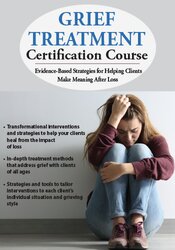

Your client’s world has been shattered following the loss of a loved one. Not only are they adjusting to these days and weeks without that person, but they are also struggling with changes to their sense of self. Who are they now as they navigate this new world? Your client is stuck in a place of paralyzing sorrow, and you’re unsure of what else to do to help.
You can transform the way you treat grieving clients with the tools and strategies you’ll learn in this 2-day Comprehensive Course!
Watch Rev. Dr. Joy Samuels, LPC-MHSP, NCC, in this recording as she leads you through the process of working with bereaved individuals and aiding them with making meaning after loss. You’ll learn evidence-based counseling strategies appropriate for the treatment of multiple types of losses, and you’ll acquire the skills you need to tailor clinical interventions to the uniqueness of each client’s grief experiences.
Watch this advanced recording and you’ll learn how to guide your clients through making meaning after loss – drastically increasing their well-being and reducing symptoms of complicated grief. You’ll walk away with the tools you need to help your clients live fulfilling lives after loss.
Best of all, upon completion of this self-study program, you’ll be eligible to become a Certified Grief Informed Professional (CGP) through Evergreen Certifications. Certification lets colleagues, employers, and caregivers know that you’ve invested the extra time and effort necessary to understand the complexities of grief counseling. Professional standards apply. Visit www.evergreencertifications.com/cgp for details.
Purchase today to revolutionize your work with grieving clients!
*We partner with Evergreen Certifications to include certification with some of our products. When you purchase such a product we may disclose your information to Evergreen Certifications for purposes of providing services directly to you or to contact you regarding relevant offers.
This online program is worth 12.25 hours CPD.
| File type | File name | Number of pages | |
|---|---|---|---|
| Manual - 2-Day Comprehensive Grief Treatment Course (4.33 MB) | 115 Pages | Available after Purchase |

Joy R. Samuels, DMin, LPC-MHSP, NCC, has over 25 years’ experience as a licensed professional counselor, Fellow in Thanatology, chaplain, and ordained minister. She teaches in the graduate clinical mental health psychology department at Lipscomb University and at Candler School of Theology at Emory University in the United Methodist Church Course of Studies. She maintains a private counseling practice and supervises those seeking licensure as a LPC-MHSP.
Dr. Samuels holds DMin and MDiv degrees from Wesley Theological Seminary, Washington, DC. Additionally, she holds an M.S. degree in counseling psychology from California State University, Northridge, CA, and a counseling certificate in substance abuse from the Northern Virginia Community College, Annadale, VA. Among her areas of expertise are individual, couples and family counseling, trauma and bereavement, and post-masters supervision.
Speaker Disclosures:
Types of Grief & Their Implications for Treatment
Assessment: Intake Considerations for Grieving Clients
Cultural Considerations for Grief Treatment
Grief Treatment: Interventions & Strategies to Improve Clinical Outcomes
In-Session Activities: On-the-Spot Interventions to Facilitate Healing
Grief Across the Lifespan: Help Your Clients Heal at Any Developmental Stage
Grief & the Family: Guide Families Through Healthy Grieving
Professional Issues: Ethical Considerations for Working with Grieving Clients, Their Families, & the Terminally Ill
| 5 |
|
| 4 |
|
| 3 |
|
| 2 |
|
| 1 |
|
Satisfaction Guarantee
Your satisfaction is our goal and our guarantee. Concerns should be addressed to info@pesi.co.uk or call 01235847393.
Please wait ...